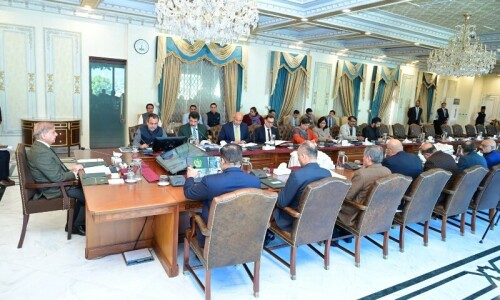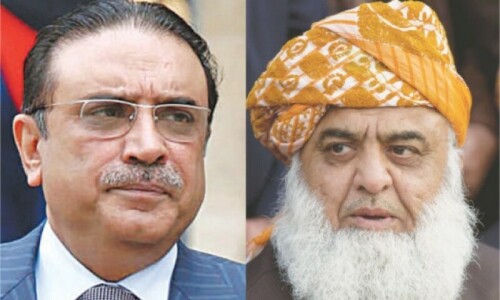ISLAMABAD, Jan 6: The crisis affecting the country’s sugar industry for the last one month is likely to cost Rs20 billion to sugarcane growers while the government will lose Rs3 billion in lost revenue.
For the first time in the country’s history, sugar prices (Rs23 per kg) have dropped below the wheat flour rates (selling at Rs37 a kilogramme in some parts of the country) as a result of what is being called by agricultural economists as a “reverse crisis” — a situation in which market forces bring down the prices of a commodity to rock bottom, making producers suffer heavy losses.
Resultantly, sugar mills have indicated favouring holding back payments to farmers this season and not paying the officially fixed sugarcane prices.
The government had fixed Rs67 per 40-kg consignment in Sindh, Rs65 in Punjab and Rs60 in the NWFP for sugarcane this season.
The millers had agreed to pay the officially-fixed rates to farmers, but only if the ex-mills price of sugar remained Rs29.5 per kg or more. Now, ex-mills prices have dropped to Rs21 a kg.
Sources in the federal Ministry of Food, Agriculture and Livestock told Dawn that they feared long delays in payment to farmers because banks would not be able to provide the mills with operating capital.
The ministry feared a strong reaction from farmers who had to pay increased input costs and a considerable reduction in the crop size of sugarcane next year.
“We are sorry. But, farmers have to suffer in the shape of delayed payments,” Iskandar M. Khan, vice-chairman of the Pakistan Sugar Mills Association (PSMA) said.
He said that the association had warned the government about the crisis in May 2007 and called for ensuring a uniform ex-factory price of sugar by discouraging the import of heavily-subsidised sugar from India. But, the government had ignored the warning, he said.
The ministry attributed the decline in sugar prices in the international market after the arrival of Indian sugar. India has produced 29 million tons of sugar this year, 10 million more than its annual domestic needs of 19 million tons. The additional sugar is now being dumped in the international market that is pulling down the prices and creating a controversy as India is paying a heavy subsidy on sugar transport from mills to ports.
The PSMA alleged that 60 per cent of the 450,000 tons of Indian duty-free sugar, meant to be exported to Afghanistan via Karachi under the Afghan Transit Trade scheme, was dumped in the Pakistani market.
The PSMA vice-chairman said that Afghanistan’s annual sugar consumption was only 150,000 tons, while India exported 450,000 tons under the scheme just in the past six months, indirectly targeting the Pakistani market.
He said Brazil and Thailand had challenged the Indian move of paying a subsidy of $37 on sugar in the World Trade Organisation (WTO). They contended that the move had distorted the international market prices.
The PSMA termed India’s move of dumping sugar in Pakistani market illegal and urged the government to challenge India in the WTO.
The PSMA also demanded of the government to launch an investigation into the Trading Corporation of Pakistan (TCP) move to import 1.6 million tons of sugar two years ago, while the country needed only 400,000 tons. He said the government had to pay a subsidy of Rs16 billion on sugar while selling it through utility stores.
The PSMA urged the government to let the TCP invite sugar procurement tenders at Rs29.5 a kg. The association believes that under the open tenders, the PSMA was procuring sugar at Rs20 per kg, which had also contributed to the crisis.
“We are ready to pay farmers official rates only if the government intervenes and stabilises the sugar prices. Otherwise, farmers would continue to suffer,” Iskandar Khan said.














































Dear visitor, the comments section is undergoing an overhaul and will return soon.